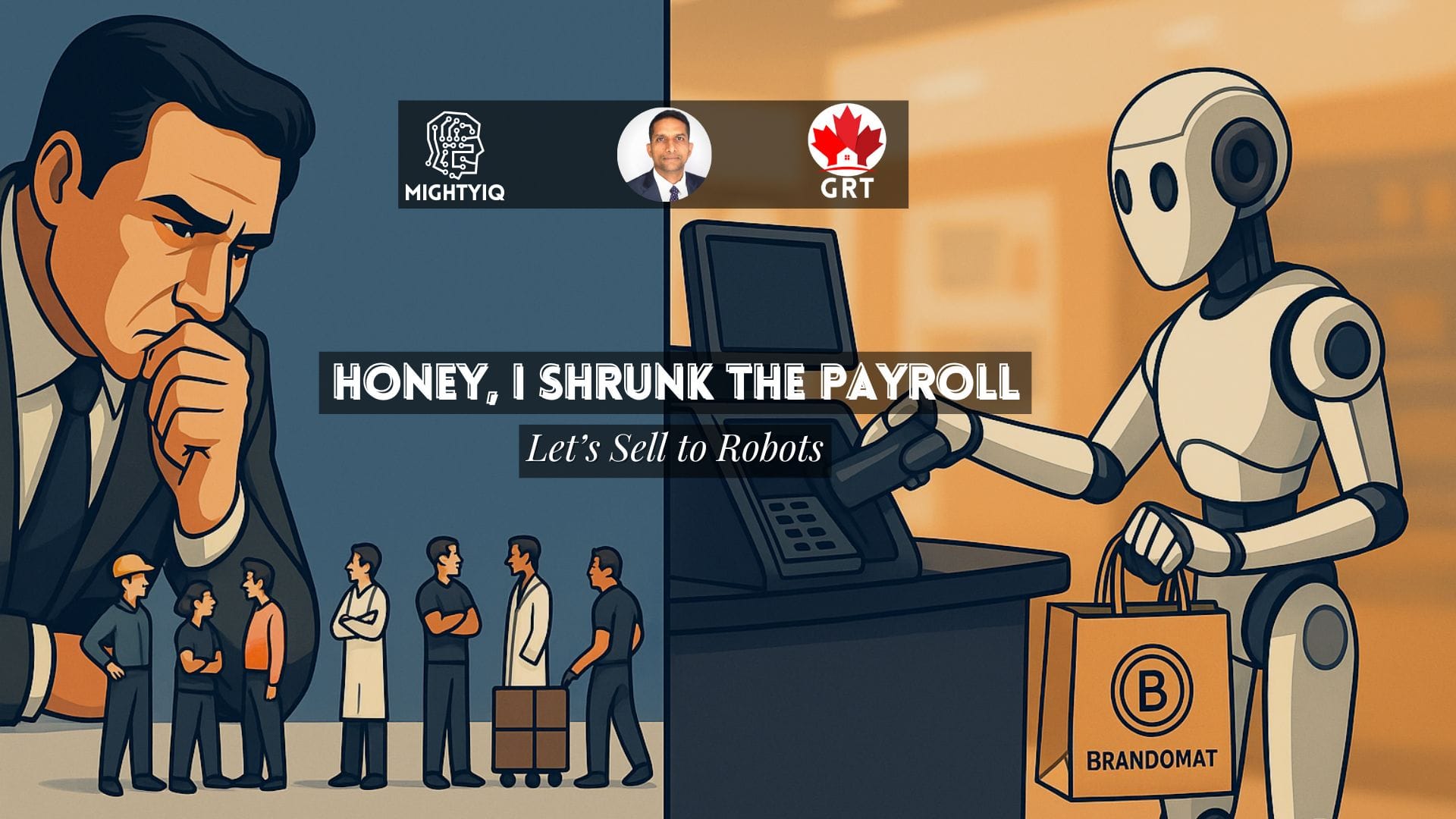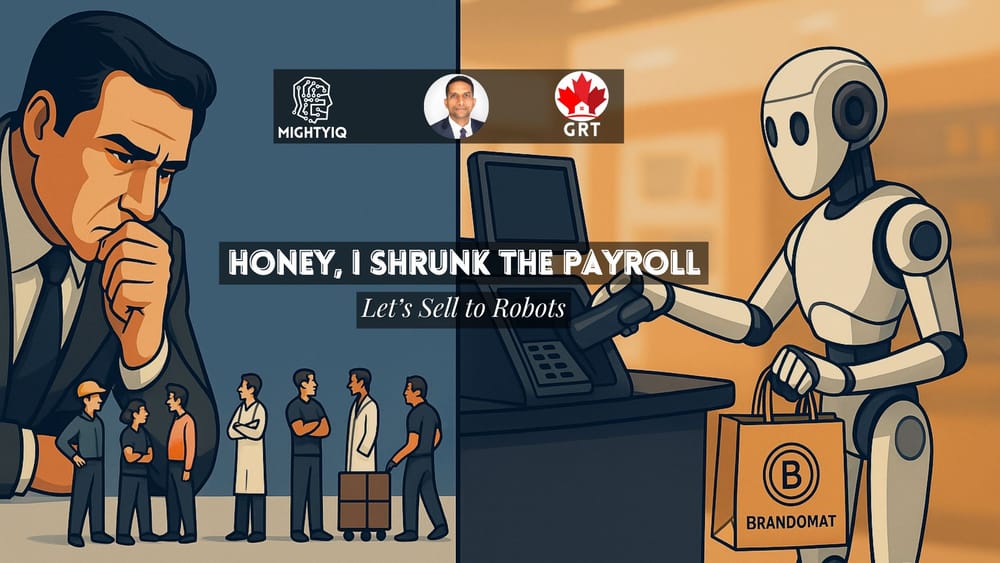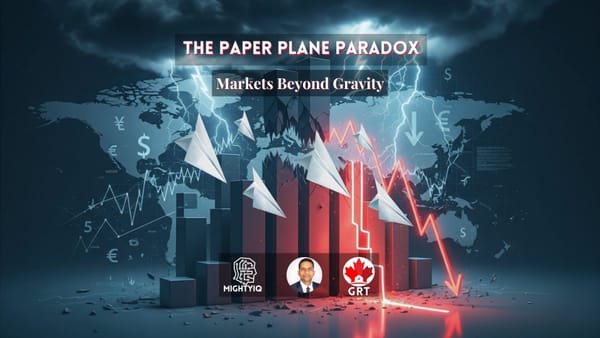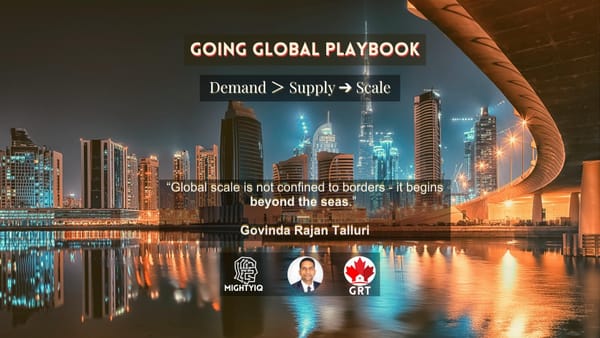Honey, I Shrunk The Payroll - Let's Sell to Robots
If only companies could sell to robots — the obsession with efficiency might finally make sense.
Because right now, what we call progress often feels more like subtraction.
Every new automation headline promises speed, precision, and scale — but quietly, people are being written out of the equation.
“Selling to robots” or “taxing them” still sounds like science fiction — but maybe it’s not that far-fetched.
But give it a few more years of machine learning, and the line between producer, consumer, and policymaker starts to blur.
And when that happens, governments will face a harder question than ever before:
👉 How do you keep policies relevant when capital scales faster than humans can adapt?
The numbers already tell the story: 5% of the ultra-rich own nearly 90% of global equity wealth, while the remaining 95% share the rest.
Lowering interest rates or expanding credit won’t fix that.
It won’t bring back the jobs we optimized away.
It just makes the imbalance look more efficient.
Because progress that excludes participation isn’t really progress — it’s precision without purpose.

🔄 What Changed This Year
The post-AI efficiency era didn’t arrive with fanfare — it slipped in quietly, line by line, policy by policy.
Productivity rose. Payrolls shrank. And governments are still writing rules for a world that’s already moved on.
In 2025, the numbers stopped being statistics — they became signals.
📊 2025 Snapshot
💼 170,000+ U.S. layoffs — spanning tech, logistics, and manufacturing
🍁 66,000 Canadian jobs lost in August, pushing unemployment to 7.1%, the highest outside pandemic years
🏭 30,000+ jobs gone in goods-producing sectors — manufacturing, construction, and wholesale
💰 Wage growth ≈ 3.2%, barely outpacing inflation
🧾 Public-sector hiring slowing as fiscal tightening begins
⚙️ AI & automation boosting profits, not payrolls
🌐 Trade uncertainty post-“Ad Gate” eroding business confidence
When companies like UPS, Ford, Nestlé, and Bell Canada begin trimming payrolls, it’s not a seasonal correction — it’s a strategic reset.
Across Alberta and Ontario, layoffs from Bell/Expertech, Microsoft Canada, and a wave of energy and manufacturing employers are hitting hardest among mid-career professionals — the backbone of economic stability.
And as U.S.–Canada trade relations turn tense, confidence is fading faster than demand.
Because when the narrative shifts from “free trade” to “fair trade,” the first thing traded off is certainty — and the second is trust.
👀 What I’m Watching
The signals suggest a labour market that’s holding its breath — steady on the surface, but quietly shifting beneath it.
Automation is no longer a future forecast; it’s a present filter.
Every boardroom decision, every efficiency gain, now runs through an AI lens.
And the question isn’t whether productivity will rise — it’s whether people will rise with it.
🚚 Logistics giants like UPS and Amazon are cutting roles despite steady demand — proof that automation is no longer reactive; it’s preemptive.
🏗️ Manufacturing and pharma are trimming payrolls as production processes go digital, and trade headwinds tighten global supply chains.
📈 AI’s impact is showing up in profits, not people. Productivity metrics look healthy, but wage growth remains anemic — signalling a deeper imbalance between technology and opportunity.
🧭 Ontario’s factory belt and Alberta’s energy corridor are showing early stress fractures, as investment migrates toward markets with stronger automation incentives and lighter regulation.
The paradox is growing louder:
as machines become more efficient, the markets they depend on — powered by human consumption — risk becoming weaker.
And that’s the defining tension of this new economy:
we’re building smarter systems, but not necessarily stronger societies.
💬 Beyond Growth Takeaway
Every revolution begins with efficiency — and ends with imbalance, unless someone rewrites the rules.
The AI era is no different. It’s not just changing how we work; it’s redefining what we value.
The next decade won’t be shaped by how fast machines learn — but by how well humans adapt.
Because progress without participation isn’t growth — it’s precision without purpose.
Governments, investors, and innovators now face a shared test:
👉 Can we scale intelligence without shrinking opportunity?
For Canada, this isn’t just about job losses — it’s about leadership.
A chance to turn automation anxiety into competitive advantage.
To design policies that reward adaptation, not just efficiency.
To measure prosperity not only by productivity, but by resilience.
The winners of this age won’t be the ones who automate fastest — but the ones who integrate best.
Who build systems where machines work smarter because humans lead wiser.
Because the future of growth isn’t man versus machine —
it’s how well they evolve together.
💬 Your Take
Are we witnessing the start of an efficiency revolution or the first draft of a jobless recovery?
And if humans built the machines, shouldn’t we also decide what kind of world they build next?
🤝 Let’s Collaborate
I’m a Canada-based entrepreneur and business growth consultant working at the intersection of technology, trade, and transformation — helping companies navigate disruption and convert uncertainty into opportunity.
My focus: guiding organizations to
🌍 diversify markets,
🧠 modernize strategy, and
⚙️ integrate AI and automation — without losing the human advantage.
What I Help With:
- 🤖 AI & Automation Strategy — aligning innovation with workforce adaptability.
- 🌐 Trade & Market Diversification — unlocking new opportunities in shifting global supply chains.
- 💼 Digital & Business Transformation — helping organizations scale sustainably through technology.
Across industries — from manufacturing to media — the winners aren’t the ones who cut fastest. They’re the ones who adapt first.
They’re building balance — not just between humans and machines, but between efficiency and empathy.
🌐 Building something new?
If you’re looking for a reliable hosting provider, I’d recommend DreamHost.
We’ve used it for our client websites for over a decade — it’s fast, secure, and built for creators who want peace of mind.
🔔 Stay Connected
If this story of work, resilience, and transformation resonates with you — let’s continue the conversation.
👉 Subscribe to my newsletter — Beyond Growth Playbook — for insights on AI, trade, and transformation: iamgrt.kit.com



